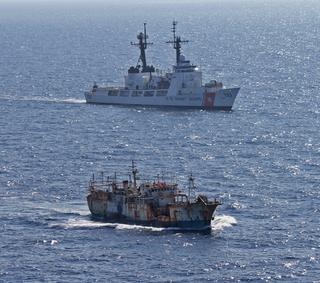Crabbers Want In on Federal Plan to Trace Illegal Seafood

Thursday, March 26 2015

A Coast Guard cutter escorts a vessel suspected of illegal fishing in the North Pacific in 2012. (Courtesy: USCG via NOAA)
A new federal plan to combat illegal seafood harvesting includes a program to trace at-risk species from harvest to market. It means regulators will have to decide what species are suffering the most from illegal activity. And as KUCB’s Annie Ropeik reports, fishermen in Alaska are hoping crab will make the list.
Alaska’s crab fleet catches many of the same species as their counterparts in Russia -- from red, blue and brown king crab, to snow and tanner crab.
But illegal fishing in Russia is thought to account for a large part of the crab that finds its way to American consumers. Studies suggest that’s cost Alaska $600 million since 2000.
People like Jake Jacobsen are hoping that’ll be enough to make regulators consider crab as they draw up new standards for tracing seafood along the supply chain. Jacobsen heads up the Inter-Cooperative Exchange, Alaska’s biggest crab harvester group.
"There’s plenty of crab around in Alaska, there’s plenty of crab around in Russia -- it’s not a matter of a species being in peril," he says "But it’s a matter of economic impact on the U.S."
Illegal fishing threatens the global stock for species like bluefin tuna, which is expected to make the cut for the traceability program. Crab isn’t so depleted -- in fact, legal quotas are on the rise for most species.
Still, Jacobsen says the crab industry can give the federal government a lot more data about the impact of illegal fishing than other species have to offer.
"Most of the information that they’ve heard relative to IUU has been from the crabbers," he says. IUU stands for illegal, unreported and unregulated fishing -- and the traceability program is just one recommendation from a presidential task force on the issue.
Russell Smith is a deputy assistant secretary for international fisheries at the National Oceanic and Atmospheric Administration, which has been helping coordinate the task force. He says crab is a high-value species, but he’s not sure yet if it’ll make the initial traceability list.
"I think it’s premature to identify what species we are going to pick, but we do know that Alaskan crab has been a species where there has been evidence of a fair amount of illegal trafficking," he says. "So that could well be one of the species that we focus on."
The task force plan also calls for better cooperation between federal, state and local enforcement agencies in cracking down on illegal fishing. And it asks for Congress to ratify the United Nations’ Ports State Measures Agreement, which aims to keep coastal nations worldwide from landing illegally caught seafood.
Smith says the U.S. would be the twelfth of 25 countries that have to ratify the U.N. treaty before it can go into effect.
"Wherever we can, we are trying to convince other nations that this is an important tool, that this is a tool that will benefit them, and that they need to go through the same process that we are going through," Smith says. "Our goal is to have it done by the end of the year."
Jake Jacobsen is hoping countries like China, Japan, Korea and Russia will be among those who sign off. He says their cooperation is key to preventing illegal crab harvesting.
"There’s no fishing boats docking in the United States with illegal crab on board," Jacobsen says. "It all comes after being laundered through Korea and China."
Japan used to be higher on that list, but Jacobsen says a new treaty with Russia has cut down on illegal landings there since last fall. And he says illegal imports into the U.S. are estimated to have dropped so far this year.
Still, he says the government’s new plan is another good step forward. It does aim to expand the traceability program to all species down the line -- but Jacobsen and others are lobbying for crab to get in on the ground floor.
NOAA will release a proposed list of the most at-risk illegally harvested species for public comment in July.


